Authentic Academic Freedom Must Be Nurtured Within the Confines of the Good and the True
By Timothy T. O’Donnell
President, Christendom College, Front Royal, Virginia, USA
By today’s standards of higher education, St. John Henry Newman’s Idea of a University would be considered revolutionary. It would cause a complete shift in modern man’s approach to education—one that for far too long has been desperately needed beyond the pockets of sanity found at the handful of faithful Catholic colleges across the country like Christendom College. The canonization of Newman brings with it an affirmation to his educational vision—an affirmation found also in Pope St. John Paul II’s Ex Corde Ecclesiae. It is a vision that links the mission of the Church directly to the university and explains the truth about academic freedom. As Newman said, “I wish the intellect to range with the utmost freedom, and religion to enjoy an equal freedom; but what I am stipulating for is, that they should be found in one and the same place, and exemplified in the same persons.”
Academic freedom is a great good, which should be cherished and honored by every university community. This precious heritage of freedom originated in the Christian West and rose initially in the great universities of Europe, which themselves sprang from the cathedral schools of the early Middle Ages. Great universities such as Padua, Bologna, Louvain, Paris, Prague and Oxford — all sprang, as the late Pope John Paul II observed, “ex corde ecclesiae” — “out of the heart of the Church.” A Catholic university has a special and unique role to play within the university community in its promotion of and defense of academic freedom. As Pope John Paul II wrote: “It is specifically a Catholic university’s privileged task to unite existentially by intellectual effort two orders of reality that too frequently tend to be placed in opposition, as if they were antithetical: the search for truth, and the certainty of already knowing the font of Truth.”
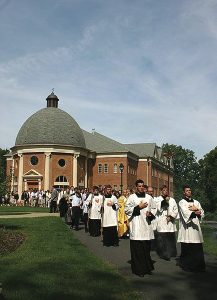
Liturgical procession passes St. John the Evangelist Library at Christendom College.
The magna traditio of Catholic higher education builds upon the two orders by which we come to know things — faith and reason. These two distinct orders of knowledge each possess their own autonomous method, but ultimately converge in their examination of reality. Since, for the Catholic, the two have a common source in God, who is the author of faith and the author of reason, Catholics have always held firmly that there is nothing to fear from sound reason in scientific inquiry. Faith and reason, each within their proper sphere, are in service to the truth and therefore complement each other in ways that are mutually reinforcing. As Pope John Paul II taught us in Ex Corde Ecclesiae, it is the “honor and the responsibility of a Catholic university to consecrate itself without reserve to the cause of truth.” It is precisely the faith dimension present within the Catholic university that makes this consecration possible. Faith, in addition to offering guidance to sound reason, also gives illumination and its own impetus to the discovery of truth and the safeguarding of authentic academic freedom. Reason, for its part, can be of great service in penetrating and explicating the supernatural mysteries proposed by faith. Both faith and reason, the Pope observes, are in service to the dignity of man and the good of the Church.
Within the Catholic university, there should never be found a truncated view of reality. Rather, there should be an openness to the fullness of truth, wherever it may be found, whether that truth bears on God, man or the created order. The free pursuit of truth has always been viewed as a most noble undertaking. Freedom, however, is not an absolute right that lives in isolation; rather, it is related intimately to the true and the good. As a matter of fact, it is only in freedom’s relation to the true and the good that authentic freedom can be guaranteed and nurtured. This Catholic vision with its deep philosophic and theological foundations is not simply a “perspective” or a “view” that is to be made present as one among many different perspectives. Rather, it is a fundamental grounding vision that gives meaning, direction and purpose to all that we do. “Because there can be no freedom apart from or in opposition to the truth, the Catholic defense — unyielding and uncompromising — of the absolutely essential demands of man’s personal dignity must be considered the way and condition for the very existence of freedom” (Veritatis Splendor, 96). Here we can see manifested the inseparable connection between truth and freedom, which is not only the foundation for the authentic freedom of the human person, but for all freedoms including academic freedom.
In order to maintain a true sense of academic freedom, it must be nurtured within the confines of what is good and what is true. Great thinkers and great ideas, which sometimes might be hostile to the Christian tradition — such as Nietzsche or Jean Paul Sartre — remain important thinkers whom students must encounter and reflect upon critically. Nevertheless, academic freedom must be lived within the university in such a way that the dignity of man and the human person is always defended, especially from violence and distortion. Some have claimed certain theatrical or film productions of dubious artistic merit and demeaning language as being essential for academic freedom, particularly in serving the need, for example, to defend the dignity of women and oppose violence against women. The latter certainly are noble goals. One cannot help but observe, however, that there are many ways within the university’s commitment to academic freedom in which the dignity of women and opposition to violence against women can be defended and promoted without resorting to offensive language and imagery. For a Catholic university and a secular university as well, a close examination of John Paul II’s Theology of the Body or a careful reading of his Apostolic Letter on the Dignity of Women could be pursued in which many of the great issues touching upon the rights and dignity of women could be discussed.
It is important to remember that especially for the Catholic university, having an open mind is not a goal or an end in itself. An open mind is not in and of itself a perfection; rather, it is a mind which is still searching — for Truth, which is the object of the intellect. It is not the purpose of the Catholic university to form students who are open-minded. Rather, a Catholic university seeks to educate free individuals with discerning minds. We want our students to have a keen intellect which is critical and reflective, which makes use of the lights of faith and sound reason, recognizing their common source. As Cardinal John Henry Newman once described, the education of the young should provide them with a “habit of mind which lasts through life, of which the attributes are freedom, equitableness, calmness, moderation and wisdom.” A discerning mind using principles of sound reason will not be “open” nor claim that everything is good and everything is worthwhile. The university exists for one specific purpose — to help form and shape the minds of its students in their search for the acquisition of truth. In this noble effort the cultivation of an appreciation of the good and the beautiful is also crucial, for as John Paul II stated in Ex Corde Ecclesiae, the Catholic university’s goal is “to help students think rigorously, to act rightly and to serve the cause of humanity better.” A Catholic university’s specific task is consecrated to this goal of using the light of faith and sound reason in the service of truth. In uniting these two orders, which characterize so much of what is best in the Catholic tradition, epitomized in the writings of Saint Thomas Aquinas and many other Fathers and Doctors of the Church, there is an openness to the fullness of reality, which, sadly, oftentimes is lacking in the secular model of the university. Sound philosophy and theology, faithful to the roots of their disciplines, have a crucial role to play within the structure of the university community and particularly in the pursuit and preservation of academic freedom.
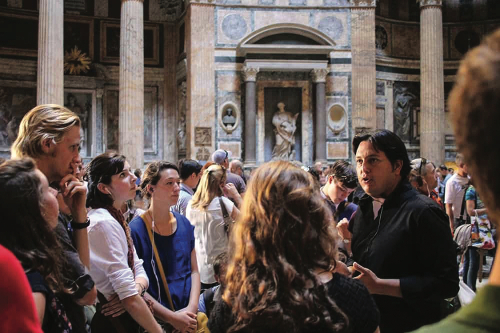
An image from Christendom’s Junior Semester in Rome
Perhaps an example might go a long way to help illustrate this point. A hospital exists for one purpose — the restoration of health. A Catholic hospital certainly would do this, but in union with the teaching of the Church, inspired by the spirit of the Gospel and Christian charity. Sadly, today there are hospitals that provide abortions and sterilizations of patients and are willing to euthanize the terminally ill in some states. Such a facility may be considered a hospital by some; such a hospital, however, could never be considered a Catholic hospital even if it should have a beautiful chapel, a priest present and be filled with beautiful religious art.
A Catholic university in our pluralistic society has a specific role to play and a unique contribution to bring to the great problems that are confronting our society and our culture. There are four essential elements that were listed by John Paul II in Ex Corde Ecclesiae that are essential characteristics for the Catholic university as Catholic:
(1) It must have a Christian inspiration, not only on the part of individuals within the university but the university community precisely as a community must have this inspiration.
(2) It must be a place where there is a continuing reflection in light of the Catholic faith upon the growing treasury of human knowledge to which it seeks to contribute by its own research.
(3) There must be fidelity to the Christian message as it comes to us through the Church.
(4) It must have an institutional commitment to the service of the people of God and the entire human family on their pilgrimage to the transcendent goal that gives the meaning of life.
Far from limiting academic freedom, such a position provides the fundamental structure in which authentic freedom can be lived.
This is why the late Holy Father states that in a Catholic university “Catholic ideals, attitudes and principles penetrate and inform university activities in accordance with the proper nature and autonomy of these activities.”
Pope John Paul II was in many ways a philosopher Pope, who remained intimately involved with the academic life of the university. In Ex Corde Ecclesiae he defines academic freedom as follows:
“Academic freedom is the guarantee given to those involved in teaching and research that, within their specific, specialized branch of knowledge, and according to the methods proper to that specific area, they may search for the truth wherever evidence and analysis leads them, and may teach and publish the results of this search, keeping in mind the cited criteria, that is, safeguarding the rights of the individual and of society within the confines of the truth and the common good.”
The Catholic university, because of its commitment to academic freedom, sometimes will have “to speak uncomfortable truths which do not please modern public opinion,” but, nevertheless, are “necessary” in order “to safeguard the authentic good of society” (Ex Corde Ecclesiae, 32). Such an institution, however, will always promote a culture based upon a true Christian anthropology, recognizing the fundamental dignity of the human person.
Just as we had remarked earlier concerning the nature of a Catholic hospital, similarly, we would say that a university that is not truly guided by these four essential characteristics set forth by the Church, may be considered a university in a secular sense, but certainly should not claim to be a Catholic university.
The Catholic university provides a home to the full and complete Truth. As Newman wrote, “It will not satisfy me, what satisfies so many, to have two independent systems, intellectual and religious, going at once side by side, by a sort of division of labour, and only accidentally brought together. . . . I want the same roof to contain both the intellectual and moral discipline.”
St. John Henry Cardinal Newman, ora pro nobis.
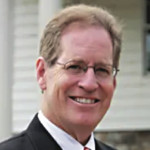 Dr. Timothy T. O’Donnell, STD, KGCHS, received his early education at Loyola Marymount in Los Angeles, California, where he graduated with B.A. degrees in Philosophy and History, and an M.A. in Church History.
Dr. Timothy T. O’Donnell, STD, KGCHS, received his early education at Loyola Marymount in Los Angeles, California, where he graduated with B.A. degrees in Philosophy and History, and an M.A. in Church History.
He completed his academic pursuits at the Pontifical University of St. Thomas Aquinas in Rome (Angelicum), where he was the first layman to receive a doctorate in Ascetical and Mystical Theology.
He was named the President of Christendom College in 1992, and has presided over the growth of the College, located in the western part of Virginia, for more than 25 years now.
In 2002, Dr. O’Donnell was appointed a consultor to the Pontifical Council for the Family by Pope John Paul II. Pope Benedict XVI renewed this appointment in 2009.
He is the author of Heart of the Redeemer, a theological investigation and spiritual guide to devotion to the Sacred Heart of Jesus; and Swords Around the Cross, a historical investigation of a crucial period in the history of Catholic Ireland.
Dr. O’Donnell is a frequent lecturer for EWTN, producing numerous programs of theological and historical interest.

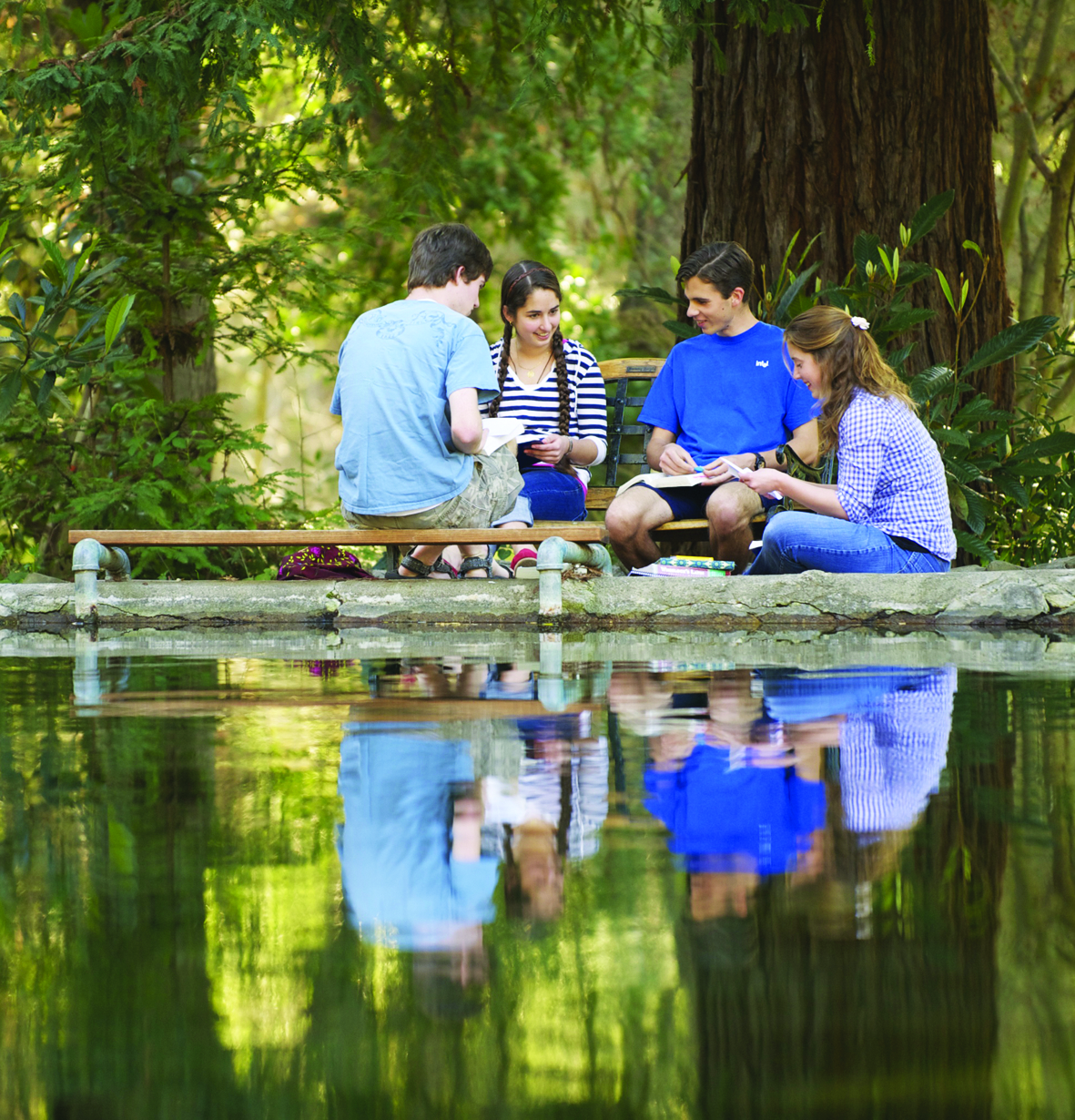

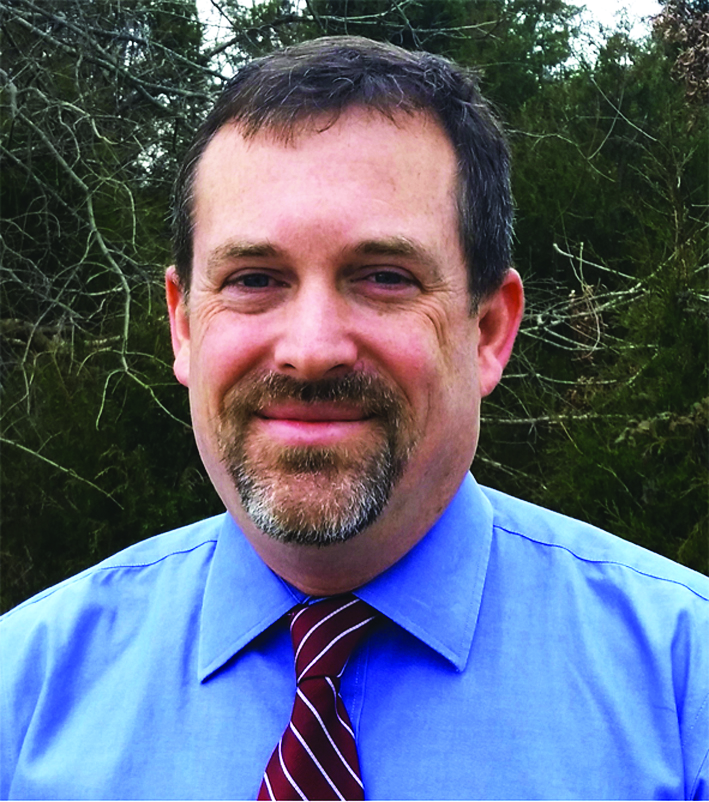
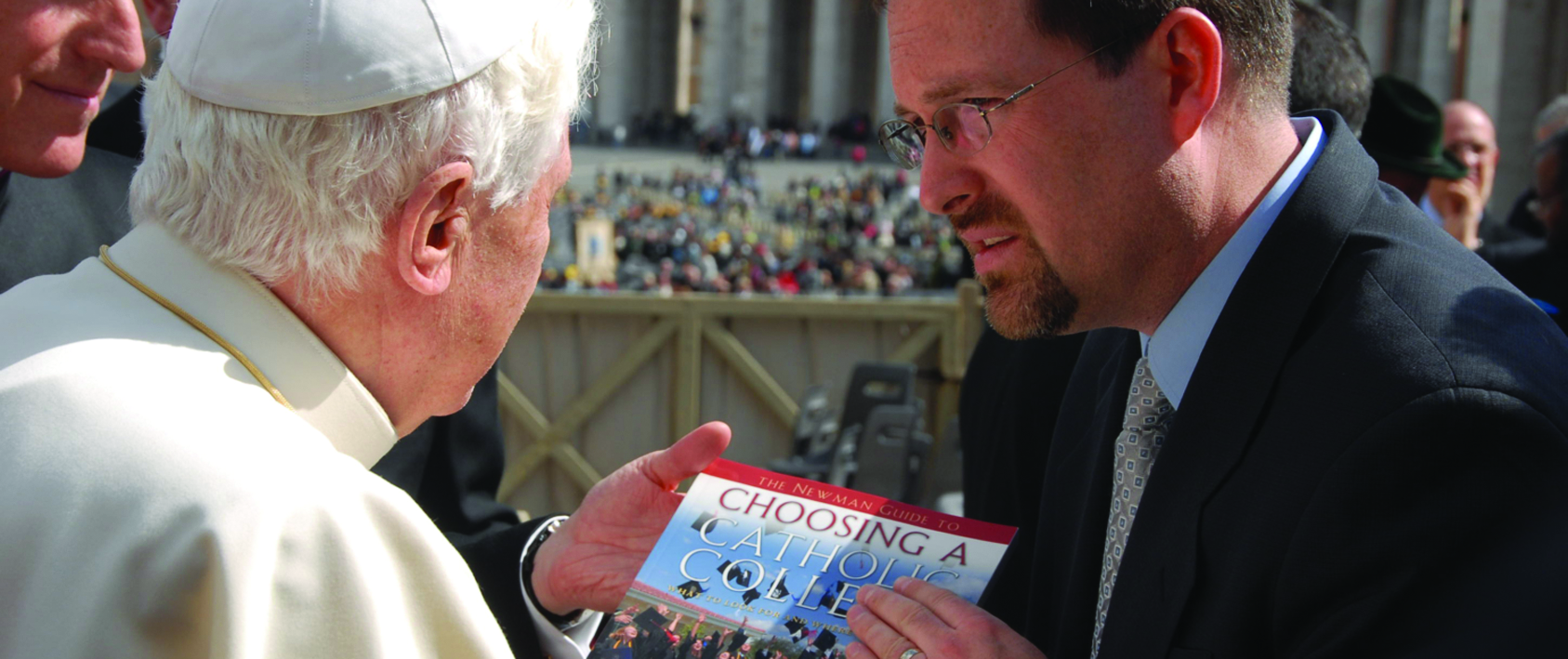
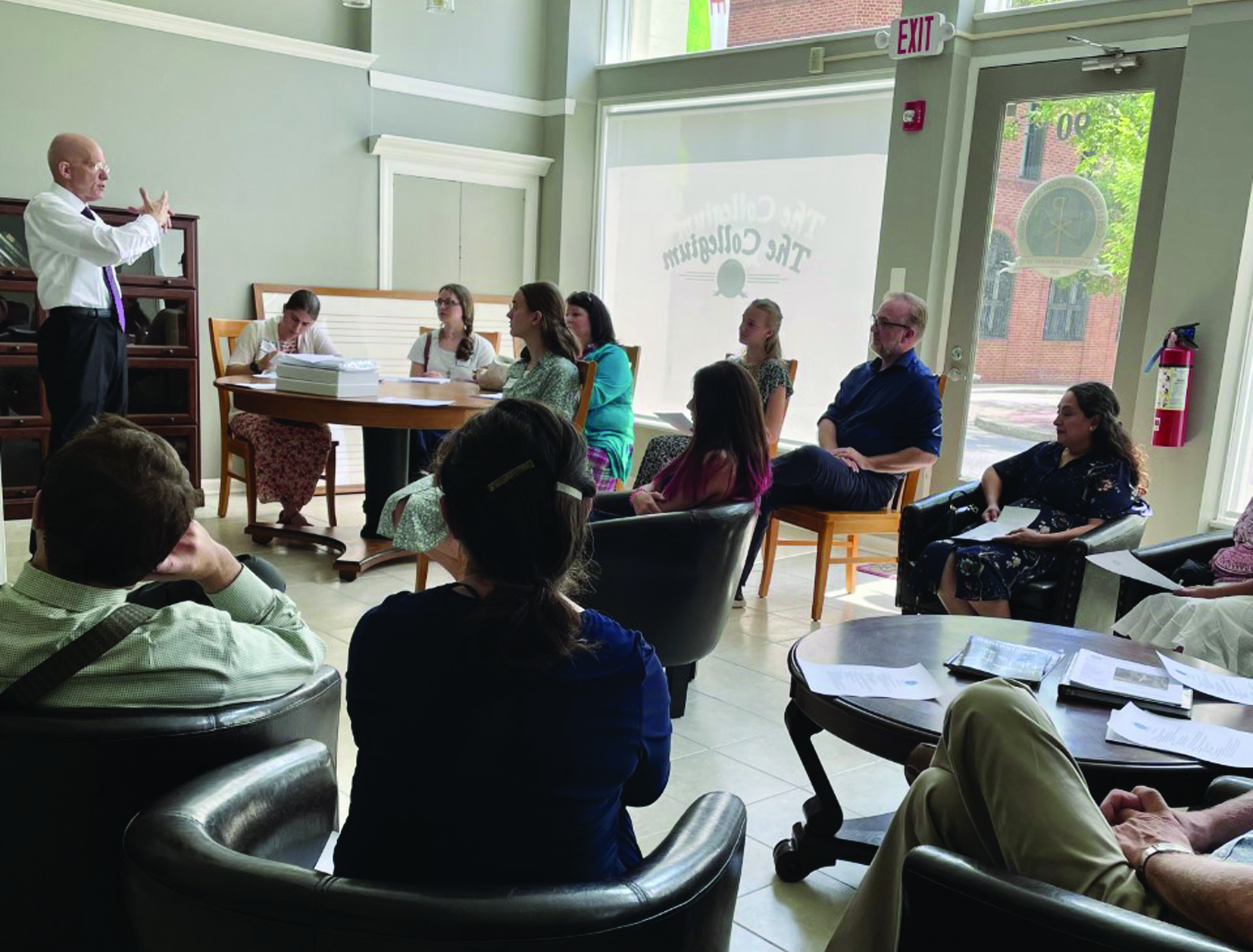
Facebook Comments